- Home
- Patrick Ness
The Crane Wife Page 12
The Crane Wife Read online
Page 12
Preposterous enough, for example, for a substantial down payment on this top-of-the-line, affordable-only-by-proper-publishing-folks printer.
It was gorgeous. It was his. It barely seemed real.
‘It seems somehow . . .’ He turned to Mehmet. ‘Am I missing something here? How did this happen?’
‘I don’t know, George,’ Mehmet said. ‘I’m not sure anybody does.’
‘Don’t you find it strange?’ he said as Kumiko lathered up his hair.
‘Lean back,’ she said, to keep his head over the sink.
‘The speed of it,’ he said. ‘The hunger for it. It seems . . .’
He didn’t finish the sentence. He didn’t really know how it seemed.
‘I am surprised as well,’ Kumiko said, rinsing off the shampoo with a measuring cup. She squeezed out the excess water, then sat him up and started combing out his wet locks, a pair of short, sharp scissors in her hand.
‘I suppose I’m just dazed,’ he said.
He felt a small hesitation in her hand, so small as to hardly even be there, before she gathered up a line of his hair and snipped its ends cleanly away.
‘Dazed in a good way or a bad way?’ she asked.
‘I’m not sure it’s either good or bad. It’s just . . . dazzling. There was nothing. Just this idle hobby of mine that meant nothing. And then there was you.’ He looked at her. She gently guided him back into a more suitable position for the haircut. ‘And all of this, too,’ he said. ‘And . . .’
‘And?’ She took another snip of his hair, moving with the confidence of a professional.
‘And nothing, I suppose,’ he said. ‘Just that this extraordinary thing has happened. Is happening.’
‘And that unnerves you?’
‘Well, yes.’
‘Good,’ she said. ‘It unnerves me, too. I am not surprised at the hunger you mention. The world has always been hungry, though it often does not know what it hungers for. But the suddenness, yes. It is rather remarkable, isn’t it?’
She combed his hair again, ready for more snipping. This haircut had happened simply. He’d said he was going to visit his local barbers – a pair of Brazilian brothers, surprisingly young, outlandishly handsome, utterly gormless – and she’d said, ‘Let me.’
‘Where did you learn to do this again?’ he asked.
‘On my travels,’ she said. ‘Plus, it isn’t so far from what I do in my work, is it? They are complementary skills.’
‘I wouldn’t want to try cutting your hair.’
He could almost feel her smile, feel the warmth of it behind him in his little kitchen, as he sat in this chair, an old sheet wrapped around his neck, newspapers on the floor to catch the clippings. He closed his eyes. Yes, he could feel her. Feel her against him. Feel the brush of her breath against his neck as she leaned in close.
‘I love you,’ he whispered.
‘I know,’ she whispered back, but it didn’t feel like a rebuke. Her knowledge felt like delight, and he knew that this was enough.
But then there was an accompanying feeling that it wasn’t enough. Do you love me? he wanted to ask, and it shamed him. Even when she said the words to him – which she did, though not as often – he always had to stop himself from asking for confirmation.
He knew so very, very little about her. Still.
But it wasn’t as if he’d told her everything either. Rachel had gone unmentioned, for one, though that was more for his daughter, who he suspected, almost certainly correctly, would be crushed if she knew. There were also, of course, the whole host of bad habits kept secret in the early days of any relationship – the toenail ablutions in bed, the laissez-faire approach to whisker maintenance, that whole dabbing himself with a square of loo roll after peeing thing – but even compared to that, Kumiko had given him almost nothing. It was unreasonable, it was untrusting, it was–
He pushed it down, fought it away.
‘I once tried cutting Amanda’s hair,’ he said, ‘when she was little.’
He heard Kumiko chuckle. ‘And how did that go?’
‘Not bad, I thought.’
‘And yet still it was only once.’
‘Well, little girls, eh?’ He frowned, his chest slightly over-filled with love for his difficult daughter. ‘Though Amanda was never a very usual little girl. Funny, always funny, and Clare and I thought that meant she was doing all right.’
‘I like her,’ Kumiko said. ‘She makes very much sense to me.’
‘I still can’t believe you met like that.’
‘The only unnatural thing would be if there were no coincidences, George. I could have walked into any print shop, for example. But I walked into yours and look at the upheaval that has resulted.’
He turned to her. ‘So you feel the upheaval, too?’
She nodded, turning him back again. ‘I have not as much time as I would like to work on my own story.’
‘Yes,’ he agreed, thinking once more of the thirty-two tiles, of what he had seen of them – the lady and the volcano, the world they were making – and of all the ones he had yet to see. She hadn’t even told him how the story ended yet. ‘Are you okay with that?’
‘For now,’ she said. ‘But you know this yourself. A story needs to be told. A story must be told. How else can we live in this world that makes no sense?’
‘How else can we live with the extraordinary?’ George murmured.
‘Yes,’ Kumiko said, seriously. ‘Exactly that. The extraordinary happens all the time. So much, we can’t take it. Life and happiness and heartache and love. If we couldn’t put it into a story–’
‘And explain it–’
‘No!’ she said, suddenly sharp. ‘Not explain. Stories do not explain. They seem to, but all they provide is a starting point. A story never ends at the end. There is always after. And even within itself, even by saying that this version is the right one, it suggests other versions, versions that exist in parallel. No, a story is not an explanation, it is a net, a net through which the truth flows. The net catches some of the truth, but not all, never all, only enough so that we can live with the extraordinary without it killing us.’ She sagged a little, as if exhausted by this speech. ‘As it surely, surely would.’
After a moment, George asked, ‘Has something extraordinary happened to you?’
‘To me,’ she said, ‘and to everyone. To you, too, George, I’m sure.’
‘Yes,’ he said, feeling the truth of it.
‘Tell me,’ she smiled, a smile so kind he felt as if he could live in it for the rest of his life.
He opened his mouth to tell her about the crane in his backyard, a story he’d been shy of up until now, especially given Amanda’s sceptical reaction to it, but maybe now was the moment to tell her of the strange bird whose life he may have saved, whose origin he could never know, whose appearance had marked the beginning of this impossible segment of his life, a segment his heart was in continual danger of breaking over in fear that it would end.
But instead, he surprised himself by saying, ‘When I was eight years old, I was run over by a car. But that’s only one version of it.’
And as she cut his hair, he told her.
‘There once was a lady,’ George said, holding JP’s hand as they walked together around the pond, ‘who was born in a cloud.’
‘Well, that can’t happen,’ JP said.
‘It can. She was born in a cloud. Like this one.’ He blew out a warm, steamy breath into the cold air.
JP’s eyes lit up and he did the same, puffing out long streams of clouds, then a row of small ones. ‘Are clouds made from breathing?’
‘I wish they were, kiddo, but it’s something to do with evaporation over the ocean.’
‘But I breathe clouds. I make clouds.’
‘Maybe you do.’
‘Grand-père?’
‘Yes?’
‘Does farting make clouds?’
George glanced down at him. JP’s face was entirely since
re.
‘Mama says farting is just stinky air,’ JP said, ‘and that everyone does it, even the Queen, but she also says my breath is sometimes stinky so that makes it stinky air, too.’
‘Impeccable logic so far.’
‘So, and if, so, if my breath makes clouds . . .’ JP paused, letting the conclusions line up in his little head. He looked up with a grin. ‘If I farted, it would make a cloud, too.’
‘A stinky cloud.’
‘A stinky cloud where the lady was born.’
‘A cloud she’d want to leave very quickly.’
‘Did you bring bread?’
‘Did I what?’
JP pointed. ‘For the ducks.’
A few shivering geese who should really have flown somewhere for the winter by now were looking hopefully up at them.
‘Damn,’ George said.
‘Is that a swear word?’
‘No. It’s something beavers make.’
‘Beavers have flat tails,’ JP said. ‘And buck teeth.’
‘You used to have a flat tail.’
‘NO!’ JP said, astonished.
‘Yeah, we were all worried about it. It fell off after you were born.’
‘After I was born in a cloud?’
‘Absolutely. A stinky cloud.’
‘Je suis une nouille,’ JP sang.
‘You’re a noodle?’
‘A cloud!’
‘Ah,’ George said. ‘Nuage.’
‘That’s what I said!’ JP said. ‘Je suis une cloud!’ He ran around in a circle for a moment, arms out, shouting it over and over, before stopping suddenly. ‘Grand-père!’ he said, thunderstruck. ‘You spoke French!’
‘Not really. I just remember a little from high school.’
‘What’s high school?’
‘Secondary school. It’s what they call it in America.’
JP’s eyes dimmed a little as a very-small-person’s calculation was made. ‘You were American?’
‘Still am.’
‘Whoa.’
‘That’s how most people react. Now, I need your help, remember?’
‘The tall bird!’ JP said and looked ferociously across the pond, standing on tiptoes to see over the heads of the geese who thought his circle-running was some kind of prelude to feeding. ‘I am not a goose, grand-père!’ JP shouted.
‘If you’re too loud, you might scare the tall bird away.’
‘I am not a goose,’ JP whispered, very loudly.
‘I believe you.’
‘I am sometimes a duck.’
‘I believe that, too.’
‘I don’t see the bird, George.’
He looked down at his grandson. ‘What did you call me?’ he asked, a bit too sharply.
JP’s face fell, his mouth stretching tight across his little jaw. ‘That’s what Mama calls you,’ he said, two tiny tears fleeing down his cheeks.
‘No, no, no,’ George said, kneeling down. ‘I’m not mad, JP. I’m just surprised.’
‘She calls you that because she loves you. Is what she says.’
‘That she does, little one,’ George said, taking JP in his arms and picking him up. ‘But for you? For you, the best love I feel is when you call me grand-père, and you know why?’
‘Why?’ JP sniffled.
‘Because you, Jean-Pierre Laurent, are the only person in this whole wide world who can call me that.’
‘The only one?’
‘The only one.’
‘I’m the only one,’ JP said quietly, trying it on for size.
‘How do you like them apples?’
JP’s smile blazed. ‘I LOVE apples! Pink Ladies are the best! Sometimes I’m a Pink Lady!’
‘Aren’t we all?’ George said, setting him down and taking his hand. They walked back along the path by the pond, but all they saw were the increasingly disappointed geese, several sleeping ducks, and the inevitable startled pigeons.
No crane, nothing unusual at all.
‘What happened to the lady in the cloud?’ JP asked.
‘She met a volcano,’ George said, slightly distracted, still looking out across the empty pond. ‘There were complications.’
He dreamed again. That he was flying.
The world was islands floating in the air, connected by rickety bridges or rope walkways. The crane flew beside him, its legs trailing behind it. ‘Which is typically crane-like,’ the crane told him. Pieces of the world spun beneath them, and they flew past flat stone saucers with rivers that flowed in rings, past ball-shaped stones where JP and Henri, both dressed as the Little Prince, walked in a happy circle, waving to him as he flew by.
‘People don’t dream like this,’ George said, setting down on a rock shaped like a football field.
‘You mean a football pitch,’ said the crane, landing next to him.
George frowned. ‘No, actually, I don’t.’
The crane shrugged, then looked away as George peered at it more closely.
‘Your eyes are wrong,’ George said.
‘Eyes are eyes,’ said the crane, still not quite looking at him. ‘Especially in a dream.’
‘Especially not in a dream, I would have thought.’ George stepped closer to the crane. It flapped its wings and flew back a few steps.
‘Manners,’ it said.
‘Your eyes are green,’ George said. ‘When they should be gold.’
The crane looked at him full-on. Its eyes were indeed green, a burning, flaming, sulphurous green. ‘And what do you know of gold?’ it asked, its voice different, wrong.
‘Who are you?’ George demanded, angry, but fear rising in his chest.
‘A question that needs no asking,’ the crane said. Lava erupted from its eyes and poured down in great cataracts towards George.
Who ran. Or tried to. The rocky surface hurtled beneath him at great speed, rushing him away from the tidal waves of molten lava, though in actuality he couldn’t quite seem to move, to make any motion except a sort of lumpy gesture at running.
‘Okay, this feels like a dream,’ he said.
‘No,’ the volcano said, rising beneath him, putting a fiery fist around George’s neck and lifting him into the air. ‘You were right the first time.’
‘Please,’ George tried to say. ‘Please, stop.’
But the volcano wouldn’t listen, lifting him higher and higher, its face blocking out the stars with smoke and flame. ‘I will not stop,’ the volcano roared. ‘I will never stop!’
It reared back and threw George across the sky at impossible speed, rocketing past the melting world, past scalding clouds that used to be lakes and oceans, past the cries of the doomed in their burning cities. George flew fast as a comet, until he could see his target, see the white silkiness of it, see the great muscular motion of its wings furling and unfurling across the impossible expanse.
He hit it, piercing it.
And it destroyed him.
He woke. Not with a cry or a sudden sitting up in bed, heart pounding. Nothing so dramatic. He merely opened his eyes.
They were wet with tears.
‘Kumiko?’ he asked of the solitary darkness of his room, knowing she was at her own home tonight, knowing this was a night where he slept alone.
He asked it again anyway. ‘Kumiko?’
But there was no answer.
‘I want you,’ he said. ‘Oh, how I want you.’
And, being George, he was ashamed of his greed.
III.
Amanda brought it to work with her. Not every day, but often. Which wasn’t even remotely appropriate given the money certain people seemed increasingly willing to spend on them, but also because it was precious to her for deeper reasons, ones she couldn’t properly articulate to herself, much less be able to explain if anyone asked. Which was the risk of bringing it to work. If anyone saw it, they’d definitely ask.
So this morning, when she left the flat, she made the firm decision not to bring it. And then, like she had a number of times befor
e, she changed her mind.
It was the usual black tile, like the one she’d seen in her father’s shop, and upon it had been placed segments of white feathers, cut and trimmed and woven to suggest a horizon and a sky, and in that sky, against a bed of shimmering down, a bird in flight. A white bird against a white sky, but definitely separate, definitely soaring but somehow, also, still. At rest.
Below the bird, one of her father’s cuttings from the pages of a book, which she (and, to be fair, often he) had always dismissed as ‘aimless natterings’, but here given new power, new context. These words – and words they were, bold ones, earthy ones, sometimes literally, a fungus here, an eggplant there and just down at the bottom, tucked away so you almost couldn’t see it, a plaintive little arse that moved her somehow, every time – these words made a mountain, as solid and present as the eternal earth, anchoring the tile in place, solidifying the stillness of the bird. There was peace here, with hints somehow that it was perhaps ragged, perhaps hard-earned, but peace nonetheless.
She hid it in the top drawer of her desk and, opening the drawer to look at it now, she felt the same as the first time she’d seen it, that she was atop a precipice and about to fall, that though it was dizzying and frightening, there was also a possible liberation in the falling.
Looking at it actually made her short of breath.
Because it also felt like–
Well, it was a stupid word, wasn’t it? Worse, a stupid notion, one that clearly hadn’t been intended, though kindness obviously had, but she could never say it out loud, never think on it too long even in the privacy of her own head.
Because it also felt like–
Well, goddammit, it felt like love. Like forgiveness, somehow, which maybe were the same thing sometimes.
At which point she always told herself that it was just a tile, for God’s sake. She really, really wasn’t the kind of person who was Moved By Art. (This was almost embarrassingly true. She had once managed the entire Louvre in an hour, a feat even Henri, through his horror, had been impressed by. ‘We’ve seen the Mona Lisa, we’ve seen the winged victory of Samothrace, and now I just want a crêpe.’ They’d then, for reasons she couldn’t quite remember, moved on to Belgium, where everything was so much crappier than France, not least that the crêpe vendors had been replaced by carts selling waffles. It was like wanting to buy air and being sold peat.) Here, though, now, in her little cubicle, she could see why word was spreading so quickly about the tiles, why the people who saw them reacted so strongly. She could barely stop herself from touching hers, from running her fingers over the top of it, from holding it close and–

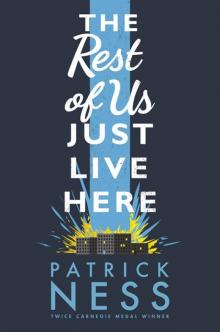 The Rest of Us Just Live Here
The Rest of Us Just Live Here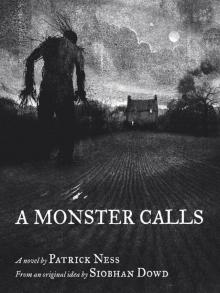 A Monster Calls
A Monster Calls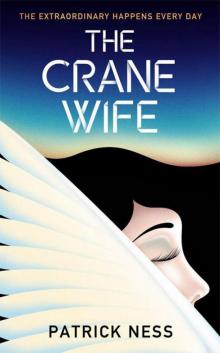 The Crane Wife
The Crane Wife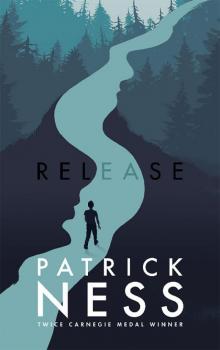 Release
Release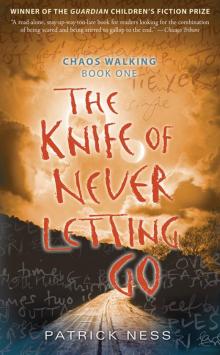 The Knife of Never Letting Go
The Knife of Never Letting Go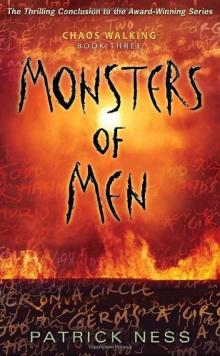 Monsters of Men
Monsters of Men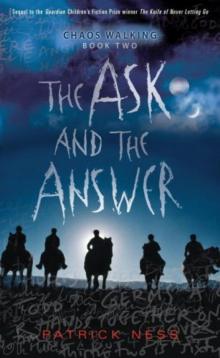 The Ask and the Answer
The Ask and the Answer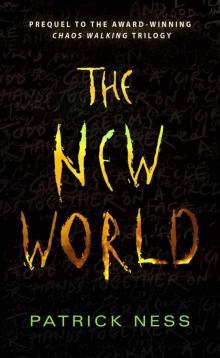 The New World
The New World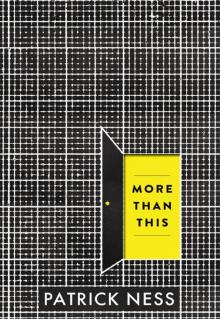 More Than This
More Than This Burn
Burn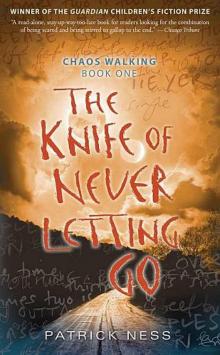 The Knife of Never Letting Go cw-1
The Knife of Never Letting Go cw-1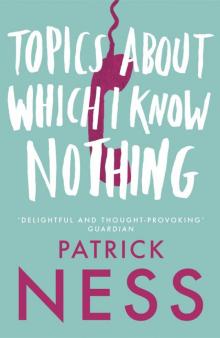 Topics About Which I Know Nothing
Topics About Which I Know Nothing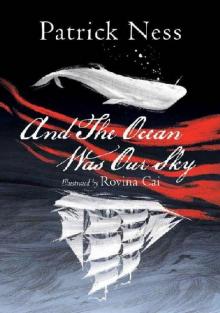 And The Ocean Was Our Sky
And The Ocean Was Our Sky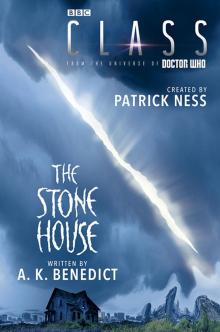 The Stone House
The Stone House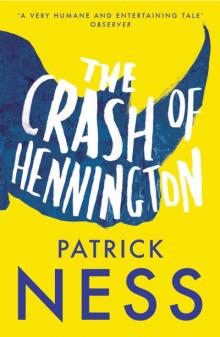 The Crash of Hennington
The Crash of Hennington Joyride
Joyride What She Does Next Will Astound You
What She Does Next Will Astound You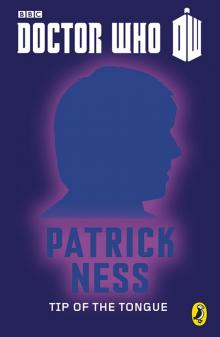 Tip Of The Tongue
Tip Of The Tongue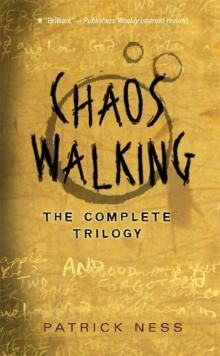 Chaos Walking
Chaos Walking